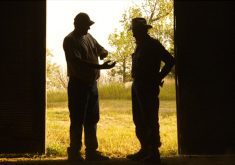It’s been well documented in recent years that farmers are experiencing high levels of stress. And although farmers are typically very resilient, when the demands placed on them exceed their strengths, talents and resources, it can go far beyond healthy levels.
Such stress responses can activate a myriad of unhealthy symptoms and behaviours, explains Kathy Somers, who runs the Stress Management and High Performance Clinic in Guelph, Ont.
For some individuals, stress causes physical symptoms such as headaches, elevated blood pressure, higher levels of pain or gastrointestinal upset. Others respond with emotional symptoms they describe as feeling keyed-up, anxious or depressed.
Read Also

‘No agenda, no attenda’: How to professionalize your family farm meetings
Establishing meeting ground rules can help a farm family find ways to communicate that work for the business and the family.
The effects of stress can also manifest as unhealthy behaviours such as drinking too much alcohol or coffee, smoking more, becoming withdrawn or experiencing a diminished capacity to problem-solve.
While there are many pressures and circumstances that farmers cannot control, by building on their strengths they can limit the negative consequences of stress. “The goal is to dial down the stress reactions so they are not negatively impacting performance and health,” says Somers, who has been teaching stress management to students, faculty and community members including farmers for almost 40 years.
Often during times of high stress, we don’t get enough sleep, and Somers says this lack of sleep can lead to a whole host of other physical and mental impairments. These include poorer judgement, reduced decision-making ability, being quick to anger, and increased conflict with family and farm team members.
When we are short on sleep, even if it’s only one night, Somers says our brain’s natural negativity bias can be even more pronounced. “It will have us remembering only the hassles and irritations of the day. When this happens day after day, we can start feeling really down and depressed.”
When thinking about problems, our brains tend to catastrophize, overestimating a problem and underestimating our ability to cope. Like cattle chewing their cud, we tend to ruminate, working a problem over in our minds again and again, says Somers.
Getting stuck on a problem does not serve us well, she emphasizes. “We have to dig to remember the good.”
Somers also recommends using the Three Pillars of Stress Management approach to taming stress. The first (self-talk) is to focus on the actions you can take to get through this rough patch. Remind yourself to protect your sleep and to eat well. You have “strengths, talents and resources that will help you weather the storm. Tell yourself, I will handle it” which can help build confidence.
Getting those worries down on paper can help us maintain a more realistic perspective and problem-solve effectively, continues Somers. Ask yourself: Can you prevent it? Can you minimize it? How will you cope? What’s your plan? What am I going to do to stay strong and connected to who or what’s meaningful? What resources am I going to activate?

“Seeing it written helps people to be less anxious,” she says. It also gives them the energy to move forward.
Somers has one caution when it comes to this process. She doesn’t recommend doing it right before bed since this could lead you to worry and keep awake. Instead, she recommends doing some calming activities afterwards to help you get a good night’s sleep.
The second pillar is self-calming. One example is to combat our physical response to the fight or flight stress response by focusing on our breath. While it may sound too simple, Somers says that by slowing our breathing we can send a message to our bodies to relax and to let go of the tension in our jaws, shoulders and back so we can breathe better.
The third pillar is to practice self-care by moving more and eating healthy. After half an hour of sitting, we should get up and move around. We should fuel our bodies with healthy foods every two to four hours (although our bodies will crave unhealthy foods when we are short on sleep, making us prone to weight gain).
This takes planning ahead for meals and snacks with complex carbs that give us energy fast and protein that breaks down more slowly to give us energy that lasts. Whole wheat bread, pasta and granola are examples of complex carbs. High-quality protein includes peanut butter, nuts, meat, fish, eggs, cheese, yoghurt and legumes.
Somers gives a hard-boiled egg with crackers, or a peanut butter sandwich or trail mix as examples of good between-meal snacks.
If we don’t eat, Somers says our bodies release stress chemicals that can result in anxiety, panic, gastrointestinal symptoms like IBS, and headaches causing our physical and mental states to deteriorate.
While it can be tempting to turn to caffeine and sugar for an energy boost, avoid these on an empty stomach as they can cause a crash about two hours later. This leaves us feeling more fatigued than if we didn’t have them at all. Instead, keep your sweets and caffeine for a healthy meal as a treat.
Coping with chronic stress
Farmers are typically good at managing unexpected stresses but in social worker Lauren Van Ewyk’s experience, chronic stress can be tougher. “It’s the chronic stress that can lead to feelings of hopelessness and helplessness.”
Succession planning is a common source of chronic stress for farmers, says Van Ewyk who is also a sheep farmer near Courtright, Ont. “With succession planning, you’re navigating both business and family. Boundaries and responsibilities are often not clearly defined or written down, which can cause strife in the family.”
The problem with chronic stress, says Van Ewyk, is that it leads to a buildup of cortisol, the stress hormone, which makes it harder to problem-solve, to weigh pros and cons, to make decisions, and to reason and evaluate. As a result, decisions can be driven by emotions instead of logic.
“You want to get to your ‘wise mind’ where you blend the logical piece and the emotional piece,” explains Van Ewyk, who suggests the following approach to help get to a more balanced perspective during challenging times.
First, identify how you’re feeling. Reflect on what is causing the stress. Is it fear that if you make the wrong decision, it will cost you thousands of dollars? Or is it that you’re angry because your father promised you the farm, but now he’s changed his mind?
Once you have identified the emotion, the amygdala, the part of the brain responsible for the “fight or flight” stress response settles down and you will be able to move to thinking with the logical side of the brain instead.
Farmers can benefit from having a support network in place when times are tough. Van Ewyk says this could mean tapping into people beyond your partner, parents or siblings.
Think about who you consider trustworthy. Who have you turned to in the past? This does not need to be the same person for all of life’s challenges. You may turn to different people for different situations.
“The support network is like scaffolding,” Van Ewyk says. “You move it to where you need it. It can be fluid; it doesn’t have to be there all the time.”
Van Ewyk offers four additional tips for getting rid of the buildup of cortisol in your system:
- Get some exercise. Go for a walk, go for a bike ride or lift weights.
- Have an ugly cry.
- Figure out if what you need is to spend time with other people or to spend time alone and do that
- Practice self-care. Treat yourself with kindness, the way you would treat a good friend.
Resources
















